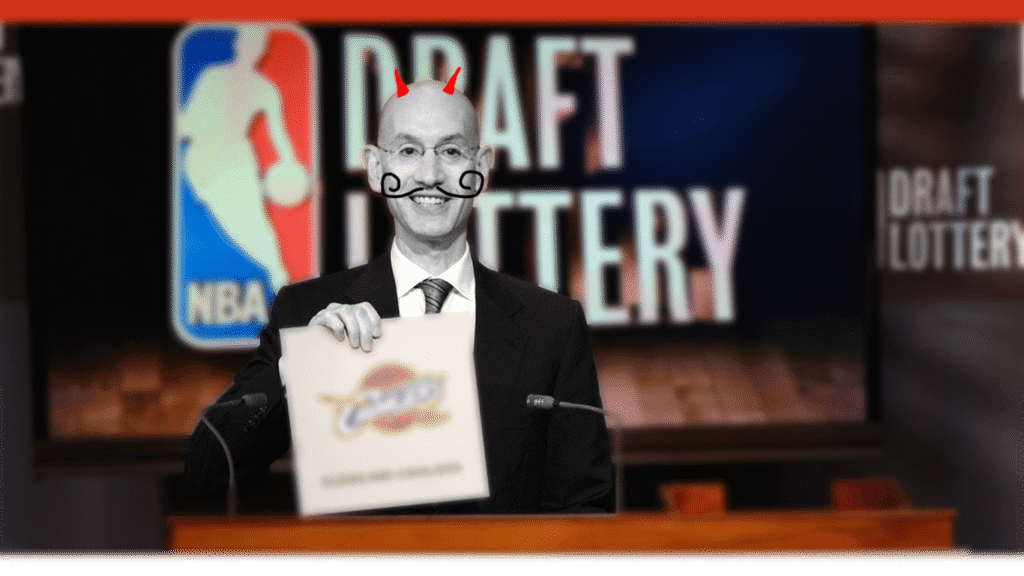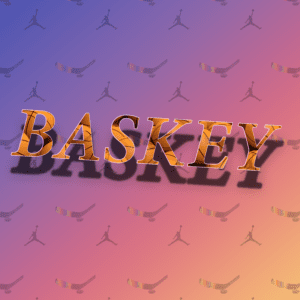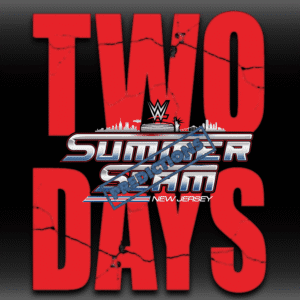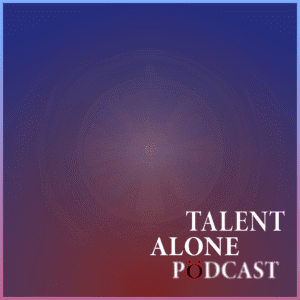
A couple of weeks ago, we all witnessed a massive injustice in the sports world. We were all left shocked and, dare I say, enraged as the Dallas Mavericks were revealed as the winners of the NBA draft lottery. The team with a mere 1.8% chance of getting the number one overall pick got the luck of the draw over Utah, Washington and Charlotte, who were at the top of the odds board, each with a 14% chance. This means instead of seeing Cooper Flagg going to Utah to create the Wonderbread Connection with Lauri Markkanen and Walker Kessler, his services will be going to the Mavs, the team that traded one of the top five players in the league in a deal where they talked to only one team and in all honestly got fleeced on the deal. The move cast a dark shadow over the franchise as it left fans angry and woeful as they called for GM Nico Harrison’s head. However, thanks to the NBA draft lottery, a team that made mistakes this year ended up winning the draft lottery. It’s also a team that, despite the loss of Luka, has some notable talent.
This isn’t an isolated incident of ridiculous lottery outcomes. You can trace shocking results back to 1993 when the Magic spectacularly jumped up 10 spots to number one when they only had 1.52% chance to do so, which gave them the top pick the year after they took the legendary Shaq O’Neil number one overall. While ‘93 is one of the oldest examples of erroneous lottery results, instances of this have picked up over the past 20 years.
In 2007, the three teams with the highest odds were the Grizzlies (25%), the Celtics (19.9%), and the Bucks (15.6%). Not only did none of those teams get the first pick, but they didn’t even get a top-three pick. In 2008, the Chicago Bulls somehow won the lottery despite ranking 9th in odds with a mere 1.7%. The Cavs had the second-highest odds in 2011. Unfortunately, they ended up with the fourth pick, however, they also happened to own the LA Clippers pick, who ended up the winner of number one overall despite only having a 2.8% chance. They had a horseshoe up their hind parts again in 2014 when they once again won the lottery despite having the 9th-best odds. In 2018, the top two picks in the draft didn’t go to one of the three teams with the highest odds of 14%. No, they went to the teams ranked 7th and 8th. Sending Ja Morant to Memphis and Zion Williamson to NOLA. Heck, just last year in 2024, the Atlanta Hawks jumped up 8 spots from ninth to receive the first pick in the draft.
There are a multitude of years where teams had statistics-defying leaps and falls on the draft board to go along with this year’s latest example. They are all examples of how the draft lottery undercuts the point of the draft, which is to allow the bad teams to get better by having top picks in an attempt to keep a level playing field. It has ramped up the conversation in sports circles about how the system needs to change. It’s a loaded question with a multitude of ideas being thrown out. Here are my suggestions, AKA the best suggestions, on how to fix the NBA draft lottery.
Adjusting the Odds
The most basic and non-drastic change. Just shift the odds. Currently, the worst three teams in the league get a 14% chance, the fourth worst gets 12.5%, and the fifth 10.5%, with it continuing to decrease down the board for the 14 teams in the lottery. This idea is less about the teams at the bottom having too high of odds and more about looking at whether or not the teams at the top’s odds are too low. Especially when you look at past lottery setups where the teams with the worst records were getting odds over 20% some years. It would be a rather simple modification to just shift some of those percentage points higher up the board so it matches America’s current economy, and those at the top have all the wealth. The question with this suggestion is how to best redistribute the odds. In order for that to best happen, we would have to look into my second suggestion.
Less Teams Eligible
Why the hell are there 14 lottery teams? That’s almost half the league. Explain to me why any team that fails to make the playoffs should have some sort of chance to get the number one overall all pick let alone a top five pick. The optics are even more puzzling ever since the play in format started. Teams that were middle of the pack and only one or two wins away from being in the playoffs shouldn’t have a chance at the top draft pick, no matter how slim the odds. It rewards teams like the Chicago Bulls, who instead of tearing things down and working to properly rebuild the team to a contending level, are addicted to making duct tape moves to extend their years-long streak of mediocrity.
I understand some may push back on this and say, “those four play in team’s odds are so low it doesn’t even really matter.” First of all, that point was proven wrong just this past month with the Mavs winning. However, even in less egregious situations, it doesn’t sit well that the fall of a metaphorical plastic ball can vault these teams into a top-four pick. All that aside, to get back to my original grievance, having 14 teams makes it harder for any potential redistribution of the percentages. If it were up to me, I would take an Elon Musk-sized chainsaw to it, cutting it down to 8, if not 6 teams. However, I realize that may seem drastic to some. So let’s compromise and just remove my initial target of the play-in losing teams. That frees up 8.7 percentage points for the number one pick alone that can be sent to the teams at the top. Is it an astronomical amount? No, but it’s an increase nonetheless. Plus, when you factor in how this would increase those teams odds for subsequent picks after number one, it helps them avoid getting even further screwed over.
We could even add a data-based reasoning for cutting teams. Take the time to do the research and see the percentage of players at each pick that go on to be long-term NBA starters of value. Start at pick one and go down the list, once you see a notable change, cut it off, and that’s how many teams make the lottery pool.
Coach Fights
There’s an old saying, “If you want something bad enough, you have to be willing to fight for it.” Time to see just how bad these teams want those top picks. Screw the odds, make those coaches go out there and take it. It sets up perfectly. 14 teams means the top two get a bye in a single-elimination tournament. They could go with either boxing rules, mixed martial arts, or even straight-up street fight style. Now we have to have some guidelines as to who teams can hire as head coach if they plan on being in the Lethal Lottery Tournament (Copyright Talent Alone 2025). For example, we can’t have teams out there hiring ringers like Alexander Volkanowski or Tyson Fury. Instead, we set some eligibility requirements. The fighting coach has to be either a former NBA player or a current/former head coach in the league. That person also has to have been with their team for at least one season. Imagine a team in the basement of the league announcing that they are hiring Rasheed Wallace as HC. I don’t wanna face that dude. What if a team like the Hawks embraces a tank and drops the bag to hire Kevin Garnett? That man slammed his head into the stanchion on a daily basis for over a decade, you think he won’t deliver a Glasgow Kiss to Willie Hardy’s dome? One can only hope that in this universe, the 76ers hire Allen Iverson so we can get the rematch between Ty Lue and The Answer.
The other benefit of this lottery model is the potential revenue. Sports is an entertainment product. Imagine the potential ratings and the payday Adam Silver could get the league by selling the TV rights for this thing. Heck, you could even put it on PPV. Who wouldn’t shell out some cash to watch “The NBA Lethal Lottery: The Fight for Flagg?” Think of the money missed out by not having “Whipping Ass for Wemby,” “The Derrick Rose Donney Brook,” “ The Battle for Blake Griffin,” “Killing for Kyire” aaaand I just killed the bit
Get Rid of It
Time to get controversial with the most jaw-dropping of ideas.
Just get rid of the damn thing. *crowd gasps*.
The main argument from pro-lottery people is that it combats tanking. Spoiler alert: No, it doesn’t. Teams in the NBA show on a yearly basis that they would rather tank for a 14% chance at the number one pick. Even though it’s not guaranteed, they still gamble on it. The only way to actually combat tanking would be to enforce rules that would never get majority approval from league owners or would face potential backlash from the players’ association.
Also, is tanking really a bad thing? Look at the league that’s the king of revenue and viewership in America, the NFL. While there’s a multitude of reasons that contribute to their success, tanking is actually a small part of what helps the strength of that league. Teams at the bottom are guaranteed those top picks, therefore, they are guaranteed to get the next crop of exciting and talented players. Not only does this help their team on the field, but it also helps their business off the field. Those big-name rookies often get promoted as impact players who can turn a team’s fortunes around, must-see guys that fans should be watching. What does that lead to? Fans get reinvigorated and come back with a new sense of hope. They buy jerseys and tickets to fill the stands. It stretches beyond their own market. Those teams now have more people tuning into their games. They become a team that the NFL is willing to put in a primetime slot. In short, it strengthens an organization’s brand and income. A key to any sports league being strong is the fact that an increase in business by any team helps all the teams.
Market size doesn’t matter as much as it used to. If the team is good and has players people want to watch, they will be a benefit to the NBA. For example, the league has experienced a nice viewership increase during this year’s playoffs, which is good considering they endured a regular season of declining ratings. Game seven of the Oklahoma City Thunder and Denver Nuggets second-round series delivered big time when it averaged 6.34 million viewers, peaking at 7.63 mil. Both those teams are in smaller markets. When the layman hears Oklahoma City or Denver, they don’t immediately think of basketball. The reason they generated so many eyeballs is because both of those teams’ feature players that are among the best in the world. In order to get those players, both teams struck gold. The Thunder acquired this year’s MVP, Shai Gilgeous-Alexander, when they traded Paul George to the Clippers. Luckily, their bet that SGA had the potential to be that good was right. As for the Nuggets, they drafted two-time MVP, and in my opinion best player in the world, Nikola Jokic in the second round. Once again, it was a bet made by their scouts that paid off. It’s good those bets paid off, because with an ass backwards system like the lottery in place, those teams may have never gotten players like that.
Now, imagine for a second a world where struggling teams could get a great player without having to hit pay dirt by making a move for somebody that other teams may have overlooked or undervalued. A world where a bad team that no one outside of their most die-hard fans feels the need to pay attention to would have guaranteed access to a franchise player. I’m talking about teams like the Washington Wizards or the small-market Utah Jazz. Both of these teams have been terrible and have been tearing things down to the studs for multiple years in the hopes of getting that top pick for a player they can build their future around. Similar to OKC, the Jazz play in an arena that’s in the bottom half of the league when it comes to capacity. However, when it comes to the Thunder, they are a revenue generator for the league because their team is really good. They have that star player who makes sure they sell out their arena all season, sell a truckload of jerseys, and pull in viewers. On the other hand, while the Wizards have the third-largest arena, but have been so bad that nobody wants to go to those games or turn their TV on to watch them.
Both the Wizard and the Jazz would begin to become more competitive and generate more revenues for not just themselves, but the league as a whole, if they got Cooper Flagg. Instead, he’s going to go to the Mavericks. A team that has a star player in Anthony Davis is already a strong market and has the ability to recruit other good players through free agency or trade. We live in a world of haves and have-nots. Cooper Flagg is going to a have, all while a situation where him going to a have not would benefit the strength of the NBA as a whole. News flash for people with their heads in the sand, tanking is good, because having parity in a sports league is good. Maybe if the NBA had that, they wouldn’t do crap viewership during the regular season.
The NBA Comes Clean
I’m no conspiracy theorist, even if jet fuel doesn’t melt steel beams. I’m just a man willing to pose those questions of what if? Go back to some of the examples I quickly mentioned at the beginning of this article. The best player in the league, LeBron James, leaves Cleveland for South Beach in 2010, and the very next year, a pick they traded for ends up winning them Kyrie Irving? A potential bone thrown to Cleveland, a team with the 11th biggest arena in the league, that was now a good market. Is it possible that, despite their high odds, once Cleveland ended up with the fourth pick, the NBA pivoted to a backup plan that saw the Cavs’ owned Clippers pick, which had odds of 2.8%, wind up winning them the services of Irving.
I’m just asking.
Despite getting the rookie of the year Kyrie Irving that year, the Cavs continued to suck and would get top five picks in subsequent drafts. Including 2013, when they won the number one overall. That time seemed legit since they had the third-highest odds at 15.6%. However, they botched it by selecting Anthony Bennet. The following offseason, LeBron hit the market. You know what would be good for business? The storyline of the best player in the world, the prodigal son of Cleveland, returning home to finish what he started by bringing the underdog city a ring. However, if that’s gonna happen, LeBron and Kyrie really could use a third piece. So wouldn’t it just be a wild coincidence if, despite having the 9th-best odds, a measly 1.7%, the now reunited Lebron James-led Cavs once again won the lottery? That pick ended up being Andrew Wiggins, who was immediately traded to Minnesota in a package for Kevin Love. Did the pieces just coincidentally fall into place for the Cavs, or did David Stern make a call to “nudge” King James to return to Cleveland with some assurance the team would be set up to add more talent?
The team that the legendary Michael Jordan turned into an iconic franchise, the Chicago Bulls, lived in the league’s basement, missing the playoffs for six straight years after MJ left. Then they turned into a meh team that made the playoffs but never made it past the second round. However, big things seemed to be on the horizon after the 2008 lottery when they made a big eight-spot jump up the board and drafted Derrick Rose. He would go on to win Rookie of the Year and the 2011 MVP before his career trajectory was derailed by a knee injury. While it didn’t go the way it was planned due to the injury, is it so crazy to think that the then-commish called in a favor? A favor that put D-Rose in Chicago, thus helping a big market team get over the hump and back to contending?
Was it not eyebrow-raising in 2019 when the Pelicans jumped six spots to win the first overall pick at a time when it was a certainty they would be trading Anthony Davis at some point soon? That trade eventually happened on NBA Draft night and just so happened to send AD to LA. The same Lakers team that just won the services of LeBron James but failed to make the playoffs. Is it not worth once again asking the hypothetical question of what if? What if a certain bald glasses sporting league commish called NOLA and asked that they “strongly consider” sending one of the best big men in the league at the time to LA? Then, hypothetically speaking, of course, they would give the Pelicans the top pick as well as a hefty package for Davis that included the Lakers pick that year. A pick that, as I mentioned, was seven spots higher than the Lakers lottery ranking. Sounds crazy I know, but think about it for a second. One of, If not the most, important NBA franchises had been a mess since Kobe retired, and even after arguably the greatest player of all time signed there they still missed the playoffs. Was that enough to motivate league officials to do some back door dealing to help the Lakers?
That finally brings us to the lottery results that inspired this article. This very year. At a time when the Lakers are a mess, and their season’s trajectory was murky at best, make a blockbuster trade for Luka Doncic. It’s wild how that all came together. No one knew Luka was on the market. How could they when Mavs GM Nico Harrison didn’t make it publicly known and only talked to one team, that being Los Angeles. Not opening the Doncic trade to all suitors is probably why most pundits consider the return for Doncic to be undervalued and not equal. We all spent the rest of the season asking, “why did GM Nico Harrison do this?” Did we get our answer at the lottery? Did the league look at a dysfunctional Lakers team, then look at Luka who was not guaranteed to resign with the Mavs and see an opportunity. Maybe they call up Rob Palinka and Nico with an idea. An idea in which one of the best players in the world goes to one an the iconic purple and gold NBA franchise to play with the biggest name in the game. After all, time was of the essence considering the chances of LeBron retiring in the near future. In return, Dallas gets a pick that gets them a potentially generational talent in Cooper Flagg.
These suggestions of hypothetical lottery rigging are just that, hypothetical. I’d rather not get sued for libel. I’m just presenting the evidence for possible corruption. It’s also meant to be slightly tongue in cheek. However, when you line up all the pieces and the potential motivations behind it,
it kind of makes you wonder.




